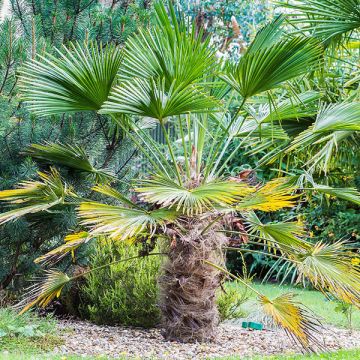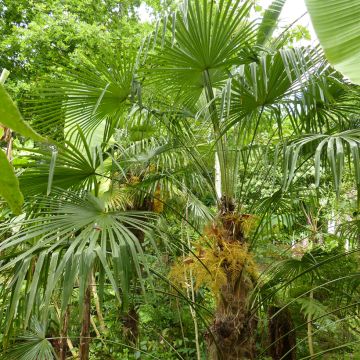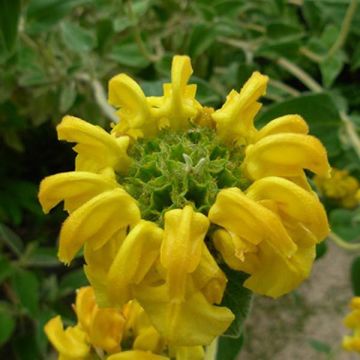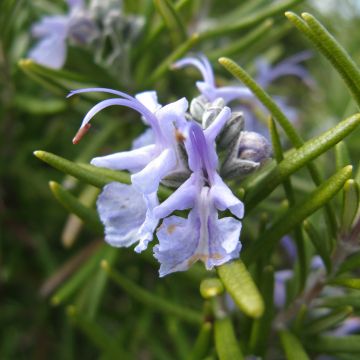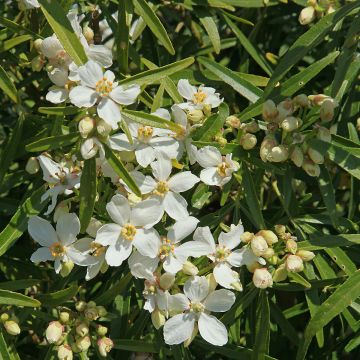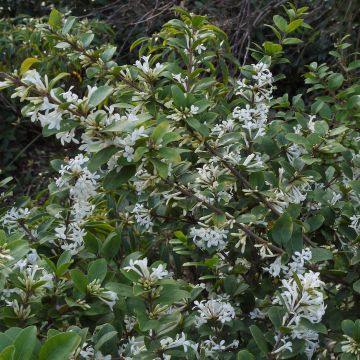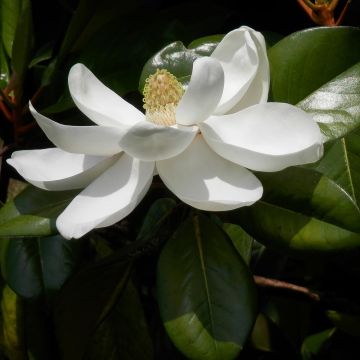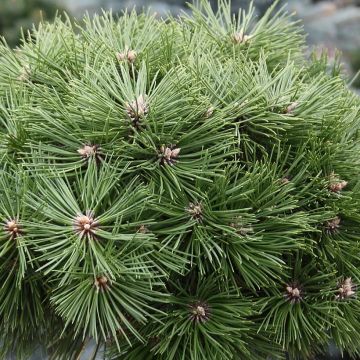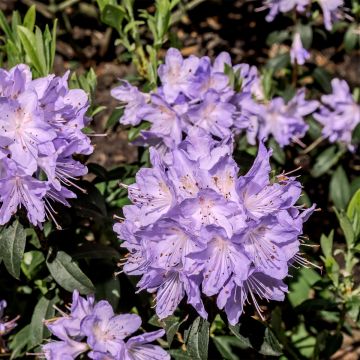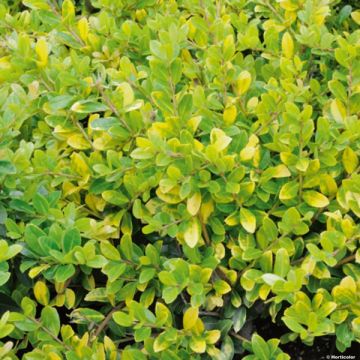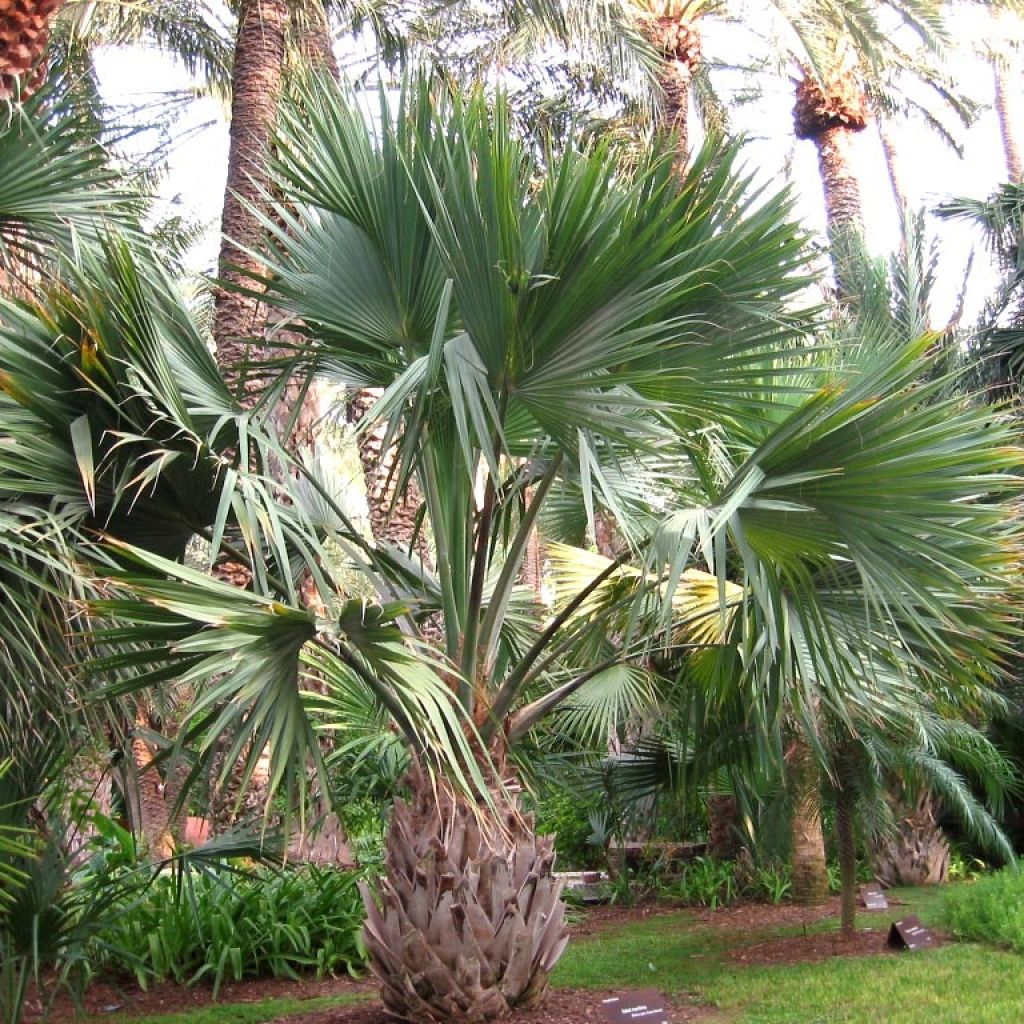

Sabal maritima - Palmier éventail de Cuba
Sabal maritima - Jamaican Palmetto
Sabal maritima
Bull Thatch, Jamaican Palmetto
Special offer!
Receive a €20 voucher for any order over €90 (excluding delivery costs, credit notes, and plastic-free options)!
1- Add your favorite plants to your cart.
2- Once you have reached €90, confirm your order (you can even choose the delivery date!).
3- As soon as your order is shipped, you will receive an email containing your voucher code, valid for 3 months (90 days).
Your voucher is unique and can only be used once, for any order with a minimum value of €20, excluding delivery costs.
Can be combined with other current offers, non-divisible and non-refundable.
Why not try an alternative variety in stock?
View all →This plant carries a 24 months recovery warranty
More information
We guarantee the quality of our plants for a full growing cycle, and will replace at our expense any plant that fails to recover under normal climatic and planting conditions.
Would this plant suit my garden?
Set up your Plantfit profile →
Description
The Jamaican Palmetto is a large palm tree native to Cuba and Jamaica, appreciated in tropical climates for its robustness, fairly rapid growth, and ease of cultivation. Similar to Sabal causarium and S. domingensis, it differs in having a more slender trunk or stipe, shorter upright inflorescences, petioles covered with light scales, and a more brightly coloured crown of fronds. In its native lands, it easily invades old fields and fallows, on rocky, sandy, and limestone soils. It develops a straight, fairly thin, whitish false trunk, topped by a very beautiful crown of intensely green, slightly trailing fronds. It is a very beautiful tropical palm tree that can only be grown in the ground in hot and sunny coastal areas, protected from severe frosts.
The Jamaican Palmetto belongs to the family of Arecaceae. It can reach a height of 18m (59ft) in nature, probably no more than 10 to 12m (33 to 39ft) in most European gardens. This species shows moderately rapid growth, adapts to any type of loose, well-drained, and deep soil, even saline, and can tolerate brief frosts of around -5 to -6°C once mature.
When young, the Maritime Sabal forms a bushy clump, and after 10 to 12 years, it develops a single false trunk (stipe), cylindrical, straight, slender, 25 to 35cm (10 to 14in) in diameter, whitish-grey in colour and smooth. The foliage is arranged in a terminal crown at the top of the stipe, and can eventually span 4m (13ft). The crown is composed of 25 costapalmate leaves, which means palmate leaves arranged in a fan shape around a central axis. In the Jamaican Palmetto, the leaf petiole can measure up to 1.8m (6ft) long and is covered with tiny light brown, deciduous scales. Each leaf, averaging 2m (7ft) in width, displays a very bright green colour. It is divided into 70 to 100 rigid segments that can measure up to 1.3m (4ft) long, with a slight cleft at the tip. Filaments are present on the axis of the segments. The flowering, which occurs on mature individuals, consists of ascending, branched inflorescences between the leaves, with cream-white bisexual flowers, slightly fragrant, of the same length as the leaves. The fruit is spherical or pear-shaped, measuring up to 1.4cm (1in) in diameter and turns black when ripe.
The Jamaican Palmetto is a magnificent specimen to plant as a standalone in seaside gardens, or in rows, especially in warm climates that are not too dry. Its hardiness will likely depend on soil drainage, duration of frosts, and ambient humidity. Plant this magnificent species near an entrance, or on either side of a gate; planted alone near a swimming pool, it will be superb and will surprise your visitors. It can be grown in a large container for several years. The plant should be stored in a tropical-type greenhouse (heated and slightly humid) during winter.
Report an error about the product description
Sabal maritima - Jamaican Palmetto in pictures
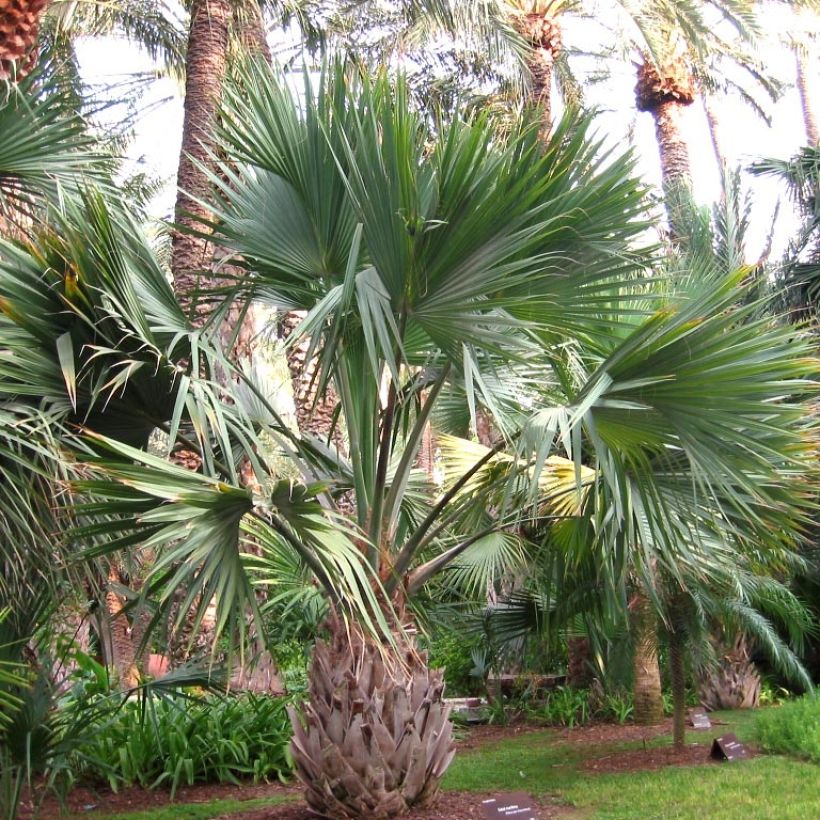

Plant habit
Flowering
Foliage
Botanical data
Sabal
maritima
Arecaceae
Bull Thatch, Jamaican Palmetto
Central America
Other Sabal
View all →Planting and care
This palm tree shows moderately fast growth, slower during its first 8 or 10 years, and requires sunshine and warmth that will promote a faster growth rate. Plant Sabal maritima in the ground in warm climates that are not too dry, where frost does not exceed -5°C (23°F) for a short period. Plant it in well-drained, light, deep and fertile soil, even limestone, sandy or saline. The soil should remain slightly moist, water regularly in summer during the first years. Choose the warmest and sunniest spot in the garden. Place it in a very sunny location and protected from cold and dry winds. It requires little maintenance except for pruning the oldest palmate leaves close to the stem.
Planting period
Intended location
Care
This item has not been reviewed yet - be the first to leave a review about it.
Similar products
Haven't found what you were looking for?
Hardiness is the lowest winter temperature a plant can endure without suffering serious damage or even dying. However, hardiness is affected by location (a sheltered area, such as a patio), protection (winter cover) and soil type (hardiness is improved by well-drained soil).

Photo Sharing Terms & Conditions
In order to encourage gardeners to interact and share their experiences, Promesse de fleurs offers various media enabling content to be uploaded onto its Site - in particular via the ‘Photo sharing’ module.
The User agrees to refrain from:
- Posting any content that is illegal, prejudicial, insulting, racist, inciteful to hatred, revisionist, contrary to public decency, that infringes on privacy or on the privacy rights of third parties, in particular the publicity rights of persons and goods, intellectual property rights, or the right to privacy.
- Submitting content on behalf of a third party;
- Impersonate the identity of a third party and/or publish any personal information about a third party;
In general, the User undertakes to refrain from any unethical behaviour.
All Content (in particular text, comments, files, images, photos, videos, creative works, etc.), which may be subject to property or intellectual property rights, image or other private rights, shall remain the property of the User, subject to the limited rights granted by the terms of the licence granted by Promesse de fleurs as stated below. Users are at liberty to publish or not to publish such Content on the Site, notably via the ‘Photo Sharing’ facility, and accept that this Content shall be made public and freely accessible, notably on the Internet.
Users further acknowledge, undertake to have ,and guarantee that they hold all necessary rights and permissions to publish such material on the Site, in particular with regard to the legislation in force pertaining to any privacy, property, intellectual property, image, or contractual rights, or rights of any other nature. By publishing such Content on the Site, Users acknowledge accepting full liability as publishers of the Content within the meaning of the law, and grant Promesse de fleurs, free of charge, an inclusive, worldwide licence for the said Content for the entire duration of its publication, including all reproduction, representation, up/downloading, displaying, performing, transmission, and storage rights.
Users also grant permission for their name to be linked to the Content and accept that this link may not always be made available.
By engaging in posting material, Users consent to their Content becoming automatically accessible on the Internet, in particular on other sites and/or blogs and/or web pages of the Promesse de fleurs site, including in particular social pages and the Promesse de fleurs catalogue.
Users may secure the removal of entrusted content free of charge by issuing a simple request via our contact form.
The flowering period indicated on our website applies to countries and regions located in USDA zone 8 (France, the United Kingdom, Ireland, the Netherlands, etc.)
It will vary according to where you live:
- In zones 9 to 10 (Italy, Spain, Greece, etc.), flowering will occur about 2 to 4 weeks earlier.
- In zones 6 to 7 (Germany, Poland, Slovenia, and lower mountainous regions), flowering will be delayed by 2 to 3 weeks.
- In zone 5 (Central Europe, Scandinavia), blooming will be delayed by 3 to 5 weeks.
In temperate climates, pruning of spring-flowering shrubs (forsythia, spireas, etc.) should be done just after flowering.
Pruning of summer-flowering shrubs (Indian Lilac, Perovskia, etc.) can be done in winter or spring.
In cold regions as well as with frost-sensitive plants, avoid pruning too early when severe frosts may still occur.
The planting period indicated on our website applies to countries and regions located in USDA zone 8 (France, United Kingdom, Ireland, Netherlands).
It will vary according to where you live:
- In Mediterranean zones (Marseille, Madrid, Milan, etc.), autumn and winter are the best planting periods.
- In continental zones (Strasbourg, Munich, Vienna, etc.), delay planting by 2 to 3 weeks in spring and bring it forward by 2 to 4 weeks in autumn.
- In mountainous regions (the Alps, Pyrenees, Carpathians, etc.), it is best to plant in late spring (May-June) or late summer (August-September).
The harvesting period indicated on our website applies to countries and regions in USDA zone 8 (France, England, Ireland, the Netherlands).
In colder areas (Scandinavia, Poland, Austria...) fruit and vegetable harvests are likely to be delayed by 3-4 weeks.
In warmer areas (Italy, Spain, Greece, etc.), harvesting will probably take place earlier, depending on weather conditions.
The sowing periods indicated on our website apply to countries and regions within USDA Zone 8 (France, UK, Ireland, Netherlands).
In colder areas (Scandinavia, Poland, Austria...), delay any outdoor sowing by 3-4 weeks, or sow under glass.
In warmer climes (Italy, Spain, Greece, etc.), bring outdoor sowing forward by a few weeks.






























